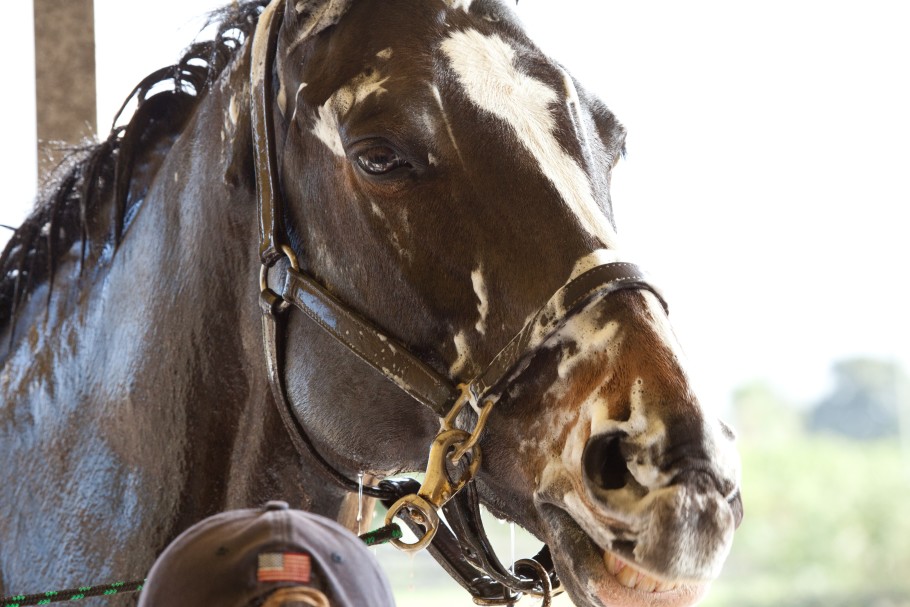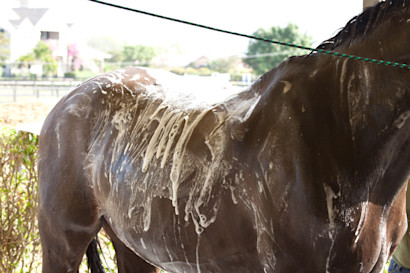Horse Bathing: How Much is Too Much?
Updated June 20, 2023

How much is too much to bathe your horse? In truth, with a lot of elbow grease, grooming your horse regularly should be enough to keep your horse’s coat in good, healthy condition. Some horses rarely (if ever) have the luxury of scrubby bath time due to their location or if they have fragile hooves.
Keep reading to learn how often to bathe your horse in warm and cold seasons, when bathing is necessary, and tips for getting your horse spotless without using the hose!
Bathing Horses in Summer

If off-season is during summer or in a warmer climate, hosing off your horse after work does not strip natural oils and can be done daily. Washing your horse with shampoo daily will strip natural oils from the coat, leaving it dull and brittle. Leaving sweat marks can lead to dry, irritated skin. Hosing off your horse with lukewarm water and sweat scraping the excess water off may be more effective in cooling down your horse than letting him dry and grooming the coat. Shampoo manes and tails as needed, and use a detangler that leaves the hair flexible and moisturized.
With all the extra water and moisture, it’s important to be mindful of your horse’s hoof health and preventing softening of the foot. After washing your horse, move them to a dry surface like another grooming stall or hand graze so his hooves can dry thoroughly. Another option is to use hoof shields or gallon-sized plastic bags during bathing to protect the feet and prevent water from running onto them.
Bathing Your Horse in the Winter
Bathing your horse in the off-season should be kept to a minimum. If the off-season is in winter, a blanket can help maintain some basic cleanliness of the horse’s coat. Manes and tails should only be washed with shampoo and a good conditioner as needed.
Bathing in cold weather (below 50℉) is only recommended if an indoor heated wash stall is available. A chilled horse can lead to a sick one. Hot toweling and spot cleaning with extra grooming time can lead to a great shine and healthy coat. Read this article for guidelines on when it's too cold to bathe your horse and alternative grooming options.
Hot Toweling and Spot Cleaning
If your horse is being worked through the winter, use the hot toweling method to remove sweat marks after exercise. Towel dry the horse and curry well to bring dirt to the surface. If your horse is very dusty, try using a hot damp towel in a circular motion. This will pick up dirt without getting him too wet. On clipped horses, witch hazel on a rag will remove dirt. Use warm water and horse shampoo to spot clean horses with skin conditions.
Strapping for a Shiny Coat
As a sidebar, a technique not practiced much these days is strapping. This technique uses a cloth or straw wisp to stroke the horse, with more of a light slapping action. It is done over the larger muscle groups and brings a brilliant shine to the coat while also improving circulation to these muscle groups.
In some racing stables, horses are strapped for 20 minutes at the end of the grooming session. They often fall asleep throughout the process and look exceedingly buff.
When Should You Bathe Your Horse?
Shampooing your horse on a regular basis leaves a coat that may be clean but often has that “fluffy” look. This is due to the lack of natural oils. If you experience this, take a break from the shampoo and spend a few extra minutes with the curry comb and body brush. Shampoo bathing a few days prior to a show or competition can help to have a shinier coat by show day as some of the natural oils will have returned to the skin.